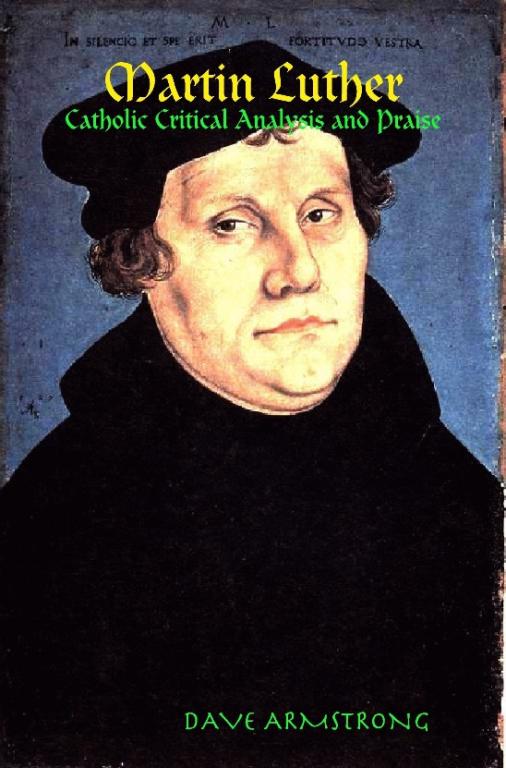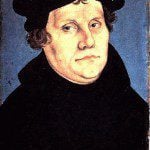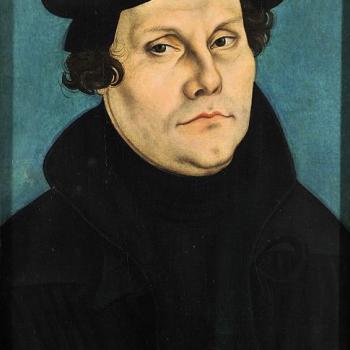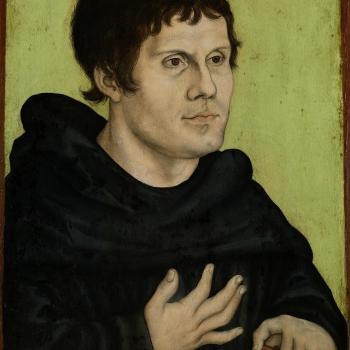
(4-17-08)
***
The question always arises with regard to a work such as this, written from a Catholic perspective: why write about Martin Luther at all? Such an endeavor is viewed in many quarters as “stirring up a hornet’s nest” or as an unnecessary provoking of undesirable tension between Christians. Life is tough enough without further quarreling, we are told. We are supposed to be beyond all that, seeing that this is an “enlightened” age of tolerance and ecumenism.
My question in return is: “why are we required to pit legitimate ecumenism and the honorable quest for Christian unity against honest, critical analysis of competing theological claims and historical inquiry?” I’m a thoroughly ecumenical Christian, and readers may rest assured that I have great respect for my Protestant and Orthodox brothers and sisters in Christ. Indications of this on my blog (see the front pages of this book) are innumerable. Thus I need not “prove” my “ecumenical good faith”.
That said, I fail to see how it is improper — or in any way unbiblical — to contend for one’s own Christian position, or to engage in apologetics (my own vocation). The effort need not be acrimonious at all. It can be done with the utmost cordiality. I try very hard to do so — not that I always succeed.
In fact, Martin Luther himself – it seems to me — would not frown upon a vigorous advocacy of a theological position (since he often did that). He certainly disagreed strongly with other viewpoints if he felt they were in error, and was not all that inclined to accept criticism of himself or his own opinions, but I doubt that he would ever say that a person shouldn’t state their disagreement or principled theological positions at all, for fear of being accused of creating yet more division amongst Christians.
That is a peculiarly modern perspective. And it derives, in my opinion, mostly from the fact that people (as a general trend of the last two hundred years or so) have a less robust Christian faith, compared to their theological ancestors. Therefore, they have less motivation to contend for the relatively few things they continue to strongly believe. In other words, the fewer theological tenets one accepts, the more they tend to make the abstract of “tolerance” the highest goal, rather than the concrete goal of pursuit of truth. This can frequently be observed today.
Indeed, all of the original Protestant leaders would have strictly opposed such a mentality. They contended for their distinctive viewpoints with great enthusiasm and a felt sense of vision. It was rare in the 16th century to hear of the current fashionable notions of “secondary doctrines”: where all parties concede that they cannot be resolved one way or the other (so that they should be ignored or consigned to relative irrelevance).
The subject matter and positions taken in this book will, no doubt, be offensive to some or even many Protestant readers. It is difficult to write about such a delicate topic: one that elicits deep feelings of allegiance. But this work is not meant to be an “attack” on Martin Luther. Apologetics isn’t political campaigning (an apt analogy in this presidential election year in America). It is, rather, a very straightforward examination of Martin Luther: the founder of Protestantism, with a concentration on massive citation of his own words.
Some “controversy,” although painful at times, is necessary and useful for the purpose of determining the relative merits of competing truth claims. I think it is self-evident that Martin Luther, as the founder of an important and influential movement within Christianity, should be held up to the utmost scrutiny, given the fact that so many basic Protestant assumptions originate (largely or solely) from him. This work is, accordingly, an analysis of the roots of present-day Protestant theology.
It is foolish for any Protestant (some of whom reject even the appellation “Protestant”) to deny the inescapable link between current-day denominational Protestantism (even beyond Lutheranism) and Martin Luther. To do so is to be uninformed about a crucial element in Protestant thought: its own root presuppositions. Any Christian body claiming to be a (or the) legitimate manifestation of historical Christianity must have a coherent story to tell. This necessarily involves historical study and some kind of theological interpretation of the history of one’s own group.
I strongly contend that no Protestant can deny an organic relationship to Martin Luther, any more than a Catholic can disavow all ties to the historic papacy, the Crusades and Inquisition, etc. Both sides must have the courage to fairly acknowledge their own shortcomings and the other side’s positive, godly attributes. We’re all products of the past.
The views set forth here are certainly one-sided, and purposely so, in order to form a conscious counter-argument to the accepted Protestant “mythology,” so to speak, of Martin Luther. His many commendable qualities are well covered in any Protestant biography (and some can be rightly classified as virtual “hagiographies”).
The objective Christian student of Church history needs to consult works written from a critical Catholic perspective as well, in order to foster a closer examination and perhaps a partial reappraisal of Luther. The full, multi-faceted, complex truth concerning important historical figures is invariably more fascinating than the usual myths that circulate about. I aim to present Luther as he was: no more, no less: as fairly as I can, but “warts and all,” too.
Lastly, the reader may wonder (in all fairness) about my own personal opinion (as a committed orthodox Catholic, and Catholic apologist) of Martin Luther. I’m happy to comply with such a desire. I disagree with the man’s theology (that is, where he departs from Catholic orthodoxy) and some of the ways in which he went about things. But I do not regard Luther (like many Catholic biographers and critics throughout history) as an essentially “evil” or “bad” man. I don’t deny his good intentions and sincerity at all (though I often question his wisdom and foresight, as will be evident).
I actually admire Martin Luther in many ways. I love his passion and boldness and bravery in standing up for what he believed. I always admire people who do that, unless the stand they take is unquestionably evil. One can respect such a person without necessarily agreeing with the specific cause or belief that he or she espouses. One can be wrong for the right reasons, and right for the wrong reasons.
I’ve written extensively about Martin Luther, and maintain perhaps the largest web page on the Internet devoted to Luther and Lutheranism, from a Catholic perspective. It may surprise some to learn that among these many papers (written over the past seventeen years) are about twenty, as of writing, where I defend Luther against myths and bum raps, cite him in agreement, or take a fairly neutral stance towards his opinion.
In one fictional, Plato-inspired dialogue I even portrayed Martin Luther quite positively (and downright affectionately), as a sort of (saved) “wise old man”. I’ve even – on occasion — received unsolicited letters of commendation from Lutheran pastors for such efforts. These aspects of my research will be utilized in the Part Two “praise” section of this book (which runs 83 pages, or about 34% of all the material — 245 pages — from Chapter One to the Bibliography).
I’ve engaged in many cordial dialogues with Lutheran scholars or pastors or informed layman, and enjoyed them very much. I’ve defended Lutheranism as well, against false charges from other Christians (for example, the bogus accusation of semi-Pelagianism, or unfounded criticism from Calvinists).
So this book is not about “Luther-bashing” or attempted “historical revisionism” or any such thing. It is simply a Catholic examination of Martin Luther: critical where I feel I must be so, in light of my own heartfelt theological adherence as a Catholic, but also appreciative of the several areas where I can wholeheartedly agree with Luther, and rejoice in those instances where he is an eloquent proponent of a position that Catholics also hold.
*****
Meta Description: Introduction to the critical + ecumenical book about Martin Luther by Catholic apologist Dave Armstrong.
Meta Keywords: Luther, Martin Luther, founder of Protestantism, origin of Protestantism, Protestant Reformation, Reformation, Protestant reformers, Reformers, Lutheranism, religious wars, 16th century Germany, Protestant revolt, Protestant Revolution, 95 Theses, Here I stand, Diet of Worms, Philip Melanchthon, Counter-Reformation, Catholic Reformation, Bondage of the Will, Peasants’ Revolt

















